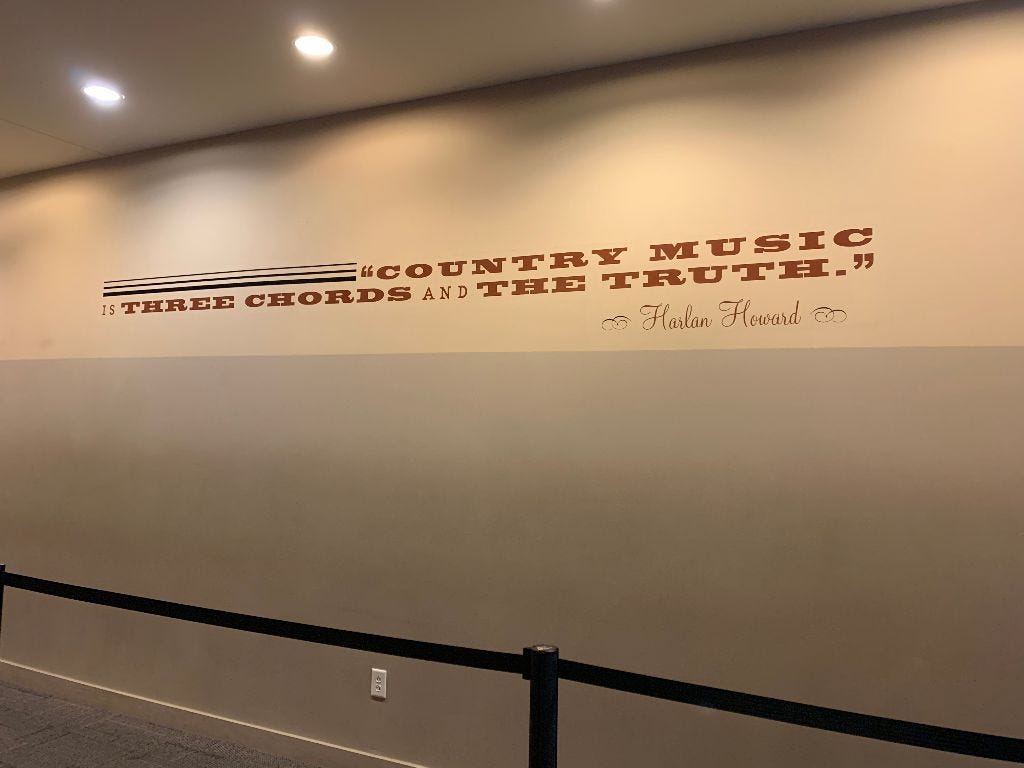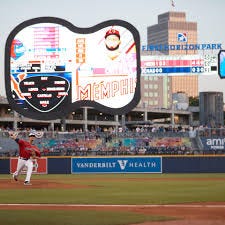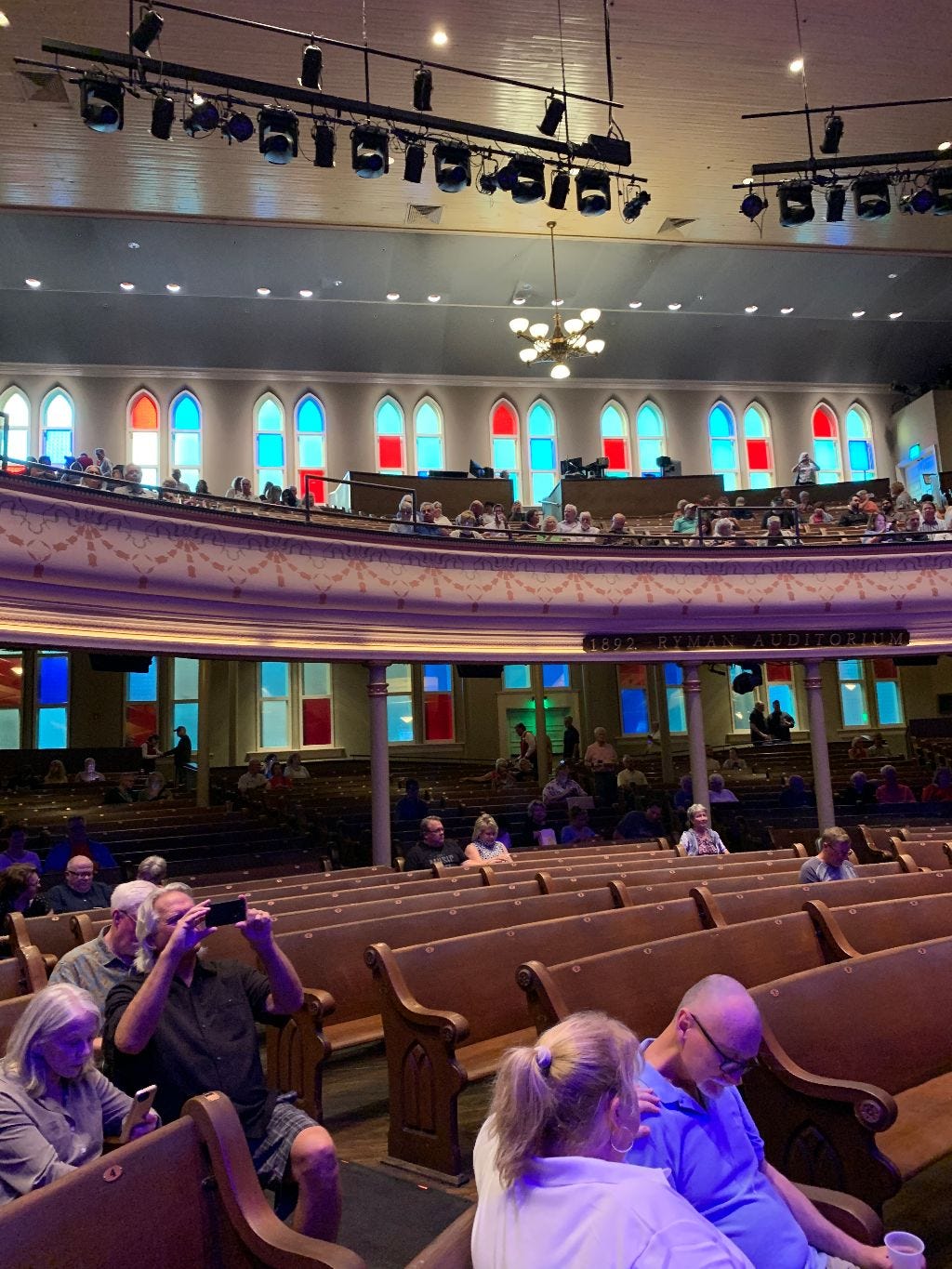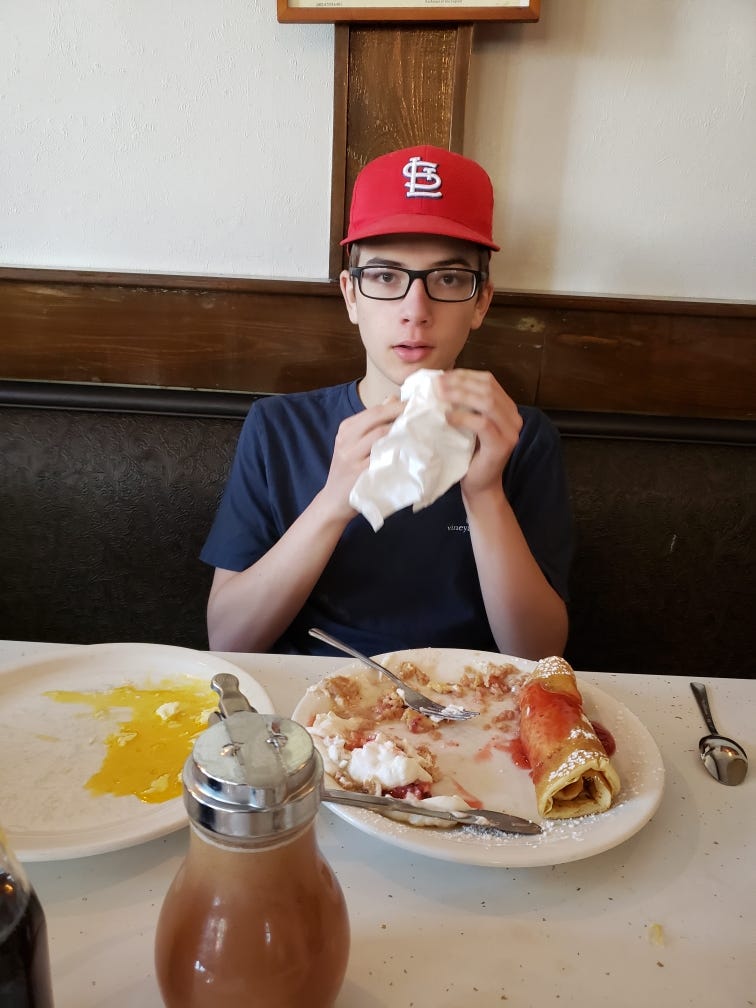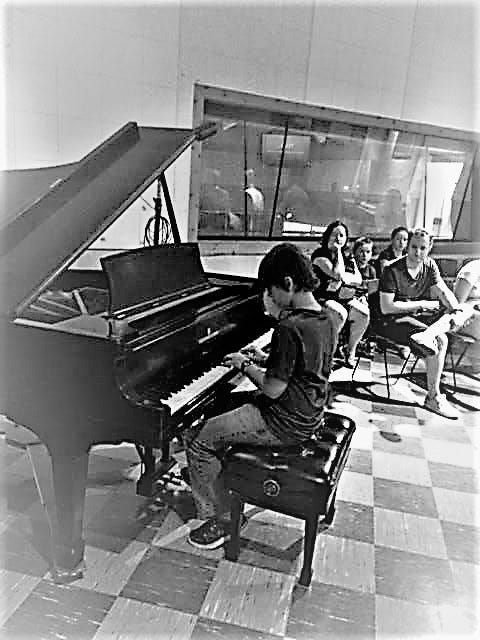My favorite city is Nashville—or maybe the idea of Nashville, I’m not always sure.
I can imagine a time in the ‘50s and ‘60s when artists like George Jones, Hank Cochran, Lefty Frizzell, Ferlin Husky, maybe Johnny Cash would be hanging around Tootsies Orchard Lounge waiting to cross the alley into the Mother Church, the Ryman, and the Grand Ol Opry. Some of them would be drunk as hell, some wearing Nudie suits (https://www.nudiesrodeotailor.com/gallery ), but all a bit or a lot crazy and talented bastards.
The Rymans’s still there, the Opry’s escaped to the suburbs, and Lower Broadway is more or less a tourist trap now, there’s even a damn Margaritaville’s, and somehow Nashville has become the go-to place for bachelor and bachelorette parties.
But, still, the ghosts remain. Tootsies remains, along with other ancient honky-tonks. Ernest Tubb’s record store remains. And, everywhere you go there’s some picker that will blow your socks off, even if he or she’s just standing on a corner.
A while back here, I lied. I said I was led to country music by hearing bands like Poco, Flying Burrito Brother, and especially Gram Parsons. But truth is my love of the music goes way back. When I was a kid, on a good Saturday night, when the atmospherics were just right, I could catch WSM 650am broadcasting the Opry, as they still do. This is all the way up in Northern, NY.
But really it was in the bars where I heard and understood the music. Lots of bars in my hometown. Drinking age was 18 but 14 was close enough. I’d sit at the bar, nobody cared, and nothing but country music would play on the juke box. I realized, even then, this music was about me and my town: poor or working class folks who’d work their asses off at bad jobs and never seem to get ahead. They were singing to us, or what I supposed I would be. Working man blues, the bottle let me down, she stopped loving me today. This was us, and nobody else was singing about us.
And there was real poetry there. How ‘bout this:
Did you ever see a robin weep
When leaves begin to die?
Like me, he's lost the will to live
I'm so lonesome, I could cry
Or this:
Living on the road my friend
Was gonna keep you free and clean
And now you wear your skin like iron
And your breath as hard as kerosene
Weren't your mama's only boy
But her favorite one it seems
She began to cry when you said goodbye
And sank into your dreams
But to me this is just as artistic:
Then you come in, a kissin' on me
It happens every time
No don't come home a drinkin'
With lovin' on your mind
The point is it’s all art of the highest order. I fear country music is no longer real and honest. Outside of a few artists like Chris Stapleton, Brandi Carlisle., Patti Loveless, Rhiannon Gibbons, Luke Combs, as always Emmy Lou Harris, and a few others, most of country music today sounds like bad ‘70s rock: loud, formulaic and predictable. But it’ll change, country music always does
THE ELVIS ADVENTURE
So push ahead a couple decades or so, when my son was still a kid. Every summer we’d head to Nashville. We’d plan ahead and this plan didn’t vary much. Thursday night, to the Nashville Sounds baseball game. Pretty good baseball and the scoreboard was, of course, in the shape of a guitar.
Friday night was the Station Inn, where the best bluegrass in the world was playing. Saturday night, the Opry, of course. Sunday night, the Ryman. Didn’t matter who was playing, it would be good.
And every morning, BREAKFAST! Not sure why, but the best breakfasts in the world are in Nashville. Probably not a bad diner in town, but here’s our three favorites: Pucketts, the Sun Diner, and the Pancake Pantry. All great, but the Pantry was phenomenal; anything you wanted, huge servings, and all delicious. Here’s proof:
Of course one has to visit The Country Music Hall of Fame. But from there you can get tickets to go to RCA Studio B, the most famous recording studio in Nashville. Everyone you can think of has recorded there and still do, but most importantly Elvis. On the bus to the Studio our guide gave us a quiz: ‘What was Elvis’ first number one record?’
No one knew, but of course I did, and I whispered to my son, ‘Heartbreak Hotel.’ My son yelled the answer out, and the guide was mightily impressed.
We arrived at Studio B. It was less than grand, really more like a tract house from the 1950s. But the acoustics were great, and amidst ancient recording equipment sat a grand piano. “That,” said our guide, “is the very piano Elvis played. And because you guessed the right answer to the quiz, you [pointing to my son] can come up and play. My son didn’t hesitate. He played a few chords and arpeggios, and was very happy. Now in his third year at Berklee. A coincidence? I think not.
ON RACE
Country music has been called ‘the white blues.’ I think that’s a misnomer as country music has always been an amalgam of both white and Black rural music and the Black and white experience. The Carter family, the first family of country music, ‘found’ much of what is now considered classic country, ‘Wildwood Flower’ for instance. But much of their music was found by a Black man named Lesly Riddle, who had access to the Black community and Black churches. He would learn the songs and teach them to the Carter family. Yet, he is little known and is not in the Country Music Hall of Fame (the Carters certainly are).
Rhianon Gibbons herself, and in collaboration with the Carolina Chocolate Drops, brought greater awareness of the Black string band tradition, central to the sound of country music. She and they have also always made known that the banjo is an African and African-American instrument.
A Black performer. Deford Bailey, appeared on the Grand Ol Opry from 1924 until he was unceremoniously fired in 1941. He is, however, now in the Hall of Fame. But another Black artist did not perform at the Opry until 1967, the great Charlie Pride.
So where are we today? There is now in Nashville ‘The National Museum of African American Music.’ It is an impressive and inclusionary show place for the Black contributions to American music. There are now many Black country artists such as Darius Rucker. Charley Crokett, Chapel Hart, and others. So while delayed, perhaps progress. The Grand Ol Opry was exclusively white because, as with almost all American institutions, they decided it would be.
Finally, the importance of Nashville’s role in the civil rights movement cannot be overstated. It is too important to be summed in a few sentences, and deserves and should have a separate submission. Nevertheless, the basics:
In 1959 and 1960 a group of students from local HBCUs, such as Fisk, began a sit-in at downtown lunch counters and diners. At the same time an economic boycott of Nashville department stores, brought enormous pressure to bear on these segregated establishments. By late 1960 major retail stores agreed to desegregate and the mayor agreed segregation was wrong and acted to end it. Much struggle remained, but essentially Nashville was the first Southern city to desegregate. What may perhaps be most significant is the number of leaders who emerged from the Nashville effort, among them Diane Nash, James Bevel, and John Lewis. From the Freedom Riders to The Edmund Pettus Bridge, they were there.
Again, a short paragraph is inadequate to capture the complexity of the Nashville Movement. I suggest visiting (on-line or in person) the Civil Rights collection at the main Nashville Library ( https://library.nashville.org/research/civil-rights-room )
A FINAL REQUEST
If you’re planning your bachelor/bachelorette party please go to Memphis, Austin, New Orleans, Las Vegas, Omaha… Anywhere but Nashville.


